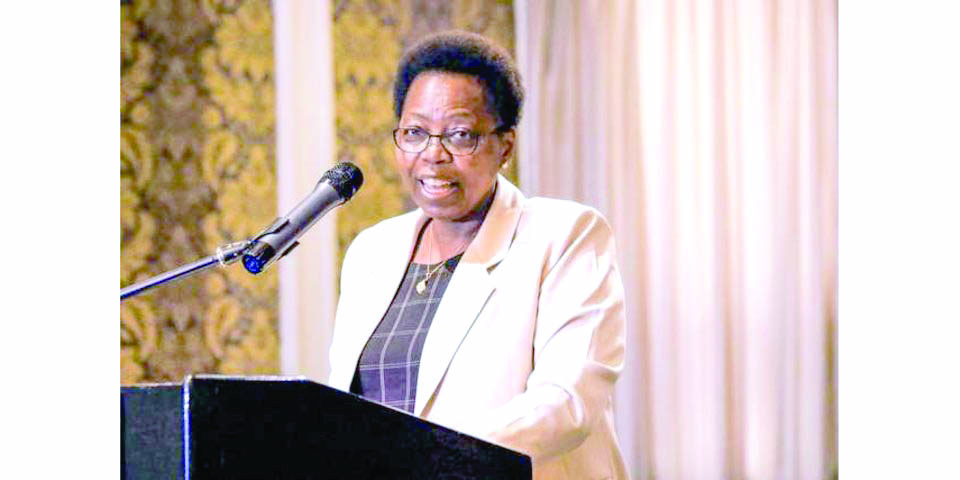Ruto Cabinet fails to comply with gender rule
By Mercy.Mwai, July 26, 2024President William Ruto’s newly unveiled cabinet hit the first roadblock yesterday after the National Gender and Equality Commission (NGEC) raised concerns that the list did not meet the two thirds gender requirement as well as it does not have any representation of persons with disabilities.
In a statement sent to newsrooms, NGEC regretted that the current nominations consist of 15 males representing 71.43 per cent which brings the total males to 17 when the President and Deputy President are included and only six females representing 28.57 per cent candidates.
NGEC chairperson Joyce Mutinda told Ruto who is the appointing Authority to ensure that the final Cabinet list fully complies with Articles 27, 54, and 55 of the Constitution of Kenya 2010.
Ruto is yet to name the next Cabinet Secretary for East African Community, Arid and Semi-Arid Lands (ASALs), and Regional Development and Attorney General after Rebecca Miano who had been named as the attorney general was moved to the Tourism docket.
She said: “This rigorous process will ensure that all appointed individuals embody the principles of equality, non-discrimination, and ethical leadership.”
Vetting exercise
The commission also told the National Assembly, which is set to carry out the vetting exercise of the cabinet secretaries beginning next week Thursday to undertake meticulous vetting of the nominees and only approve those who meet the stringent requirements outlined in Chapter Six of the Constitution regarding leadership and integrity.
The sentiments by the commission came just a day after Ruto named the remaining 11 batch of cabinet secretaries after last week he named 11.
Those named include Kithure Kindiki (Interior and National Coordination), Debra Mlongo (Health), Alice Wahome (Lands), Julius Ogamba (Education), Soipan Tuya (Defence), Andrew Mwihia (Agriculture), Aden Duale (Environment), Eric Muuga (Water), Davis Chirchir (Transport), Margaret Ndung’u (ICT) John Mbadi (Treasury), Salim Mvurya (Trade), Rebecca Miano (Tourism), Opiyo Wandayi (Energy), Kipchumba Murkomen (Sports), Hassan Joho (Mining), Alfred Mutua (Labour), Wycliffe Oparanya (MSMEs), Justin Muturi (Public Service) and Stella Soi (Gender).
Principles of equality
With respect to gender equity, NGEC which is mandated to monitor, facilitate, and advise on the integration of the principles of equality and freedom from discrimination across all national and county policies, laws, and administrative regulations within public and private institutions regretted that this composition does not comply with Article 27(8) of the Constitution of Kenya 2010, which stipulates that no more than two-thirds of the members of an appointive body should be of the same gender.
Mutinda explained that for a Cabinet with a maximum of 25 members (including the President, Deputy President, Attorney-General, and 22 Cabinet Secretaries), there should be no more than 16 members of the same gender. She said: “To comply with this requirement, women must fill the remaining two positions for the Attorney-General and one Cabinet Secretary. Additionally, at least one of these female candidates should be a person with a disability. The final composition would then be 17 males and 8 females, ensuring that no more than two-thirds of the members are of the same gender.” The commission also regretted that in the new list, there is no representation of persons with disabilities among the nominees.
This, Mutinda said, is a missed opportunity for the progressive realisation of the five per cent representation requirement stipulated in Article 54(2) of the Constitution of Kenya 2010.
She said: “Any subsequent nomination must bring in a member with disability as noted above.”
Positive steps
On youth representation, the commission noted that only one nominee Eric Muriithi Muuga (32) nominated as the Water, Sanitation and Irrigation representing 4.76 per cent is a youth as all the other nominees are 35 years and above.
Mutinda however welcomed the new move as a positive step towards complying with Article 55 (b) of the Constitution of Kenya 2010 which obligates the State to take measures, including affirmative action programmes, to ensure that the youth have opportunities to associate, be represented and participate in political, social, economic and other spheres of life.
She said: “His inclusion represents an effort to address the youth constituency’s need for representation in high-level decision-making.”
With regards to inclusion of Marginalised Communities, the commission welcomed the decision by Ruto to appoint five individuals from this front representing 23.81 percent.
